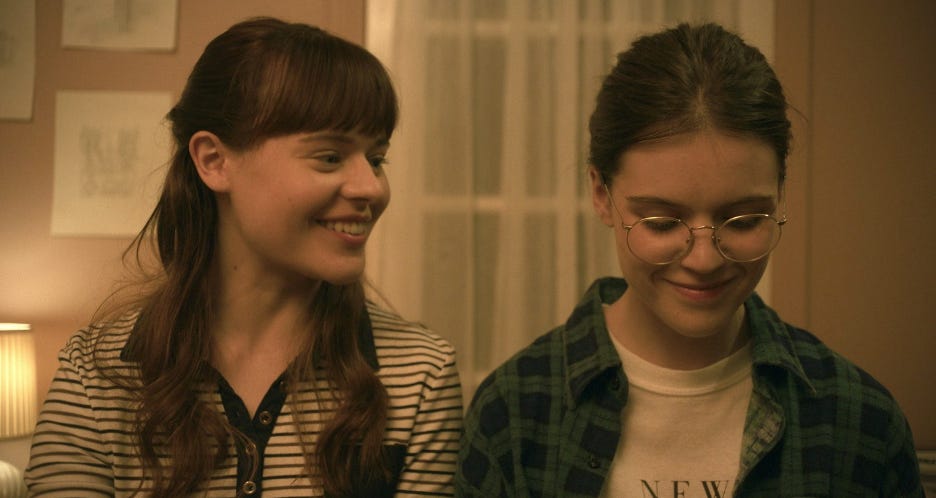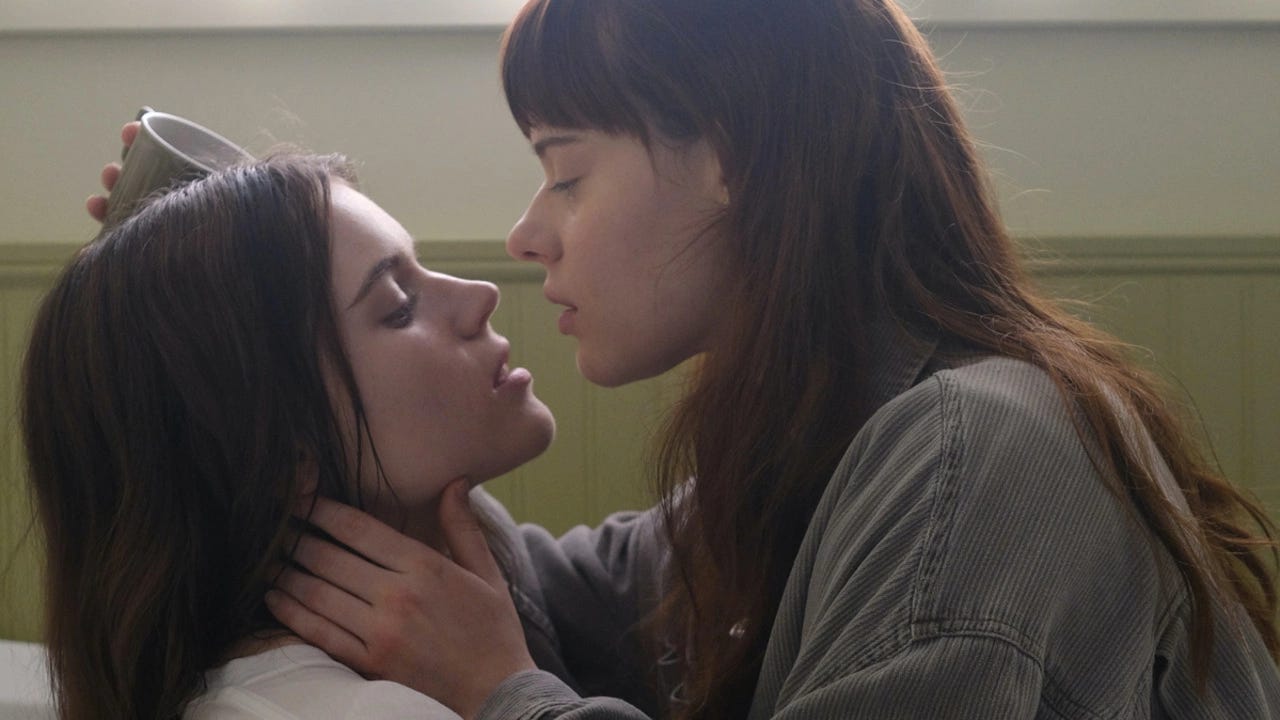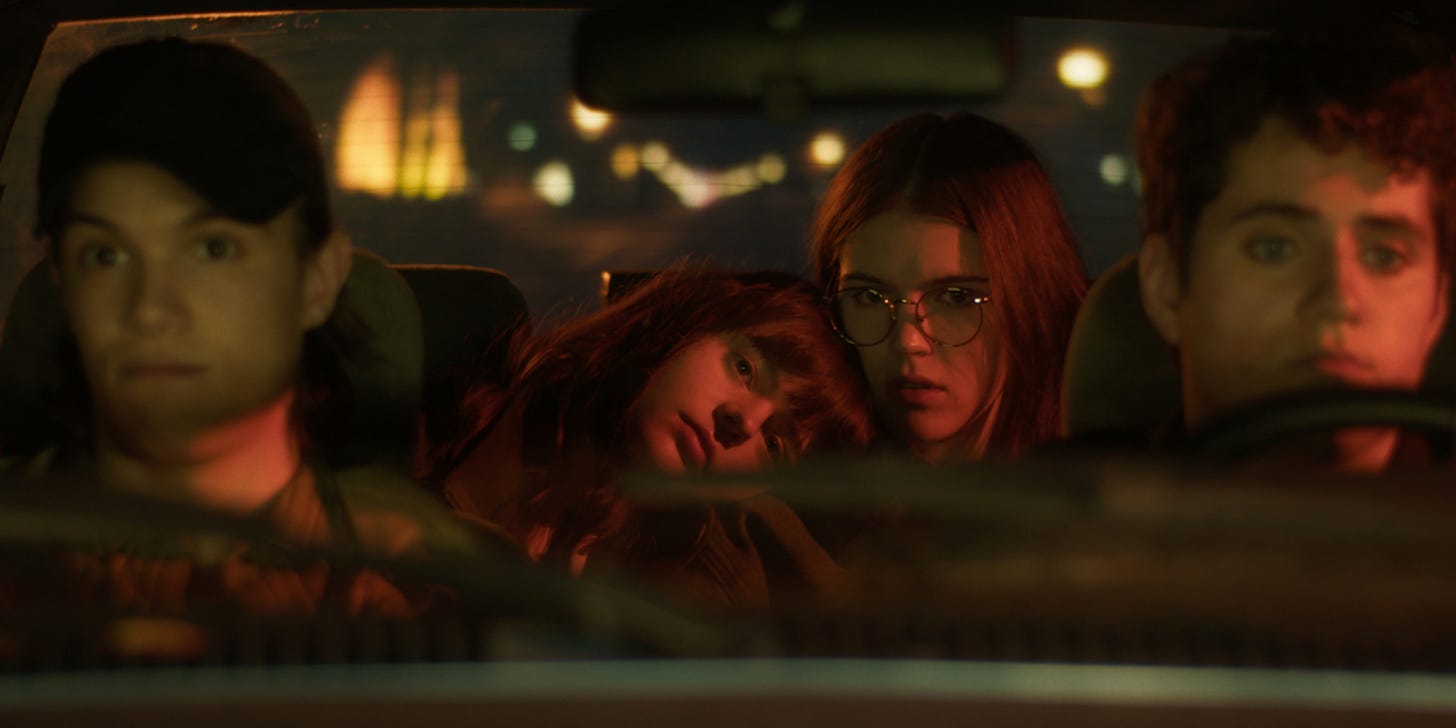Review: Paradise on Earth
Baptism as foreplay in Sarah Watts & Mark Slutsky’s ‘You Can Live Forever’
The Yearning Rating: ✰✰½
Romance: ✰✰✰
Sex: ✰✰✰
Storytelling: ✰
Performance: ✰✰½
Yearning: ✰✰✰✰
Sit back, relax, and consider hitting the ♥ button on this post—that way, more readers can discover us on Substack.
Light spoilers ahead.
Written by Ali Romig
Early in writer-directors Sarah Watts and Mark Slutsky’s romantic drama You Can Live Forever, gruff new girl in town Jamie asks her classmate Marike—a Jehovah’s Witness—if she’s trying to convert her. “Only if you want me to,” Marike responds, cheekily. Aside from the palpable sapphic tension present in this moment, it stuck with me for the way it set up the push and pull between Jamie and Marike which drives much of the film forward towards its (somewhat predictable) end. Our theme stated, for anyone else who took an introduction to screenwriting class. Both long to test the religious and physical boundaries of their relationship, but only as far as the other is willing to go. This constant waiting for and taking of cues makes for a movie that is filled to the brim with tension—oftentimes at the expense of a deeper motivating force.
The 90s-set Canadian film follows Jamie (Anwen O'Driscoll) as she temporarily moves in with relatives after the death of her father. Her mother isn’t mentioned much beyond short one-sided phone calls, but we are able to surmise that she needs space to mourn, thus leaving Jamie with her devoutly religious aunt and uncle. While Jamie’s sexuality isn’t explicitly mentioned until later in the film, the clues are all there. Subtly greasy hair? Check. Wire-rimmed glasses? Check. A seemingly endless reserve of flannel? Check! Beyond her wardrobe, Jamie is presented as an outsider from the moment she steps foot in her aunt and uncle’s small Quebec town, home to a close-knit Jehovah's Witness congregation. She wanders around the neighborhood smoking pot and listening to rock music on her walkman, both brazen and isolated, letting us know that even if her sexuality were irrelevant, this isn’t a place she’d fit in. This is further emphasized when her aunt makes her wear a dress to attend one of the congregation’s meetings. Jamie looks about as natural in the ill-fitting garment as Brianna Hildebrand did in her wig in First Girl I Loved (iykyk).
It’s at this meeting that Jamie is introduced to Marike (June Laporte). Marike is the exact opposite of Jamie—a true believer, who looks as comfortable among the congregation as most people would in their own homes. As the two girls embark on a quickly deepening friendship, it becomes clear just how different they are—but also, how their desire for one another so easily overrides everything else (a detail that while intoxicating to watch, also felt a little disingenuous).
You Can Live Forever has a pacing problem. The first half of the movie is both speedy and meandering. The quick clip with which Jamie and Marike fall into one another felt noticeably unrealistic and I was left longing to understand what they saw in each other. There are many minimally scripted scenes of them playing cards, hiking, and making friendship bracelets that gesture at shared interests without actually offering any specifics. At the same time, I felt like it took a while for the movie to find its footing and begin to pick up any kind of momentum. I was only really drawn in about halfway through, once the girls’ growing attraction is finally realized. At that point, each stolen moment felt urgent and laced with anxiety as I waited for the inevitable—someone to catch them.
The actors, too, seemed to come alive in the second half of the film. Unfortunately, their early flirting is rather charmless (sorry!) and it’s only once their characters are able to give into their impulses that I felt their chemistry stir up in earnest. In fact, the movie became surprisingly sexy by the end! This is a turn I was not expecting, given that one half of the pair is eagerly awaiting the rapture1. But in You Can Live Forever religion is not a deterrent to physical pleasure—rather, it’s almost a catalyst. Jamie and Marike share their first kiss after they pray together. They have sex for the first time after a bathtub baptism. They use service outings as an excuse to make out in the back seat of Marike’s car. This is something I’d probably find subversive and refreshing if only it didn’t feel so…out of nowhere?
This links back to a larger issue I had with the film. I was excited when I saw that You Can Live Forever took place among a tight knit community of Jehovah’s Witnesses. It’s a religion I don’t know much about, and I was interested to see that perspective on screen, especially knowing that co-creator Sarah Watts grew up in a similar community in Canada. However, I finished the movie feeling like I really didn’t have any better sense of the religion then when I’d started. That’s not to say that I expect to learn all there is to know in one short romance movie, but I guess I’d been hoping for a deeper exploration of what it meant to accept “The Truth,” especially as it related to Marike. I appreciated that Marike’s beliefs were—if not endorsed—treated deferentially by the filmmakers, but I still felt like her characterization was steeped in stereotypes. Not so much maliciously as lazily. I also would’ve enjoyed a more nuanced look at how she reconciled her deeply held beliefs with her…dare I say hasty pursuit of Jamie. Overall, the religious community the characters exist within felt like a nebulous force of repression that remained largely undefined.
Still, despite lacking a specificity that could have elevated the film, the setting did lend itself to a growing sense of claustrophobia. In a scene that stood out to me as particularly grounded, Jamie confides in her friend from school, Nate (who is not a Jehovah’s Witness), about her relationship with Marike. After admitting that they kissed, she asks Nate if he’s surprised. “It was kind of obvious,” he replies. “Yeah, that’s the problem,” Jamie laments. Despite not believing in “The New System,” or “The Truth,” or whatever it is that the Jehovah’s Witnesses believe in (see? I warned you that I didn’t learn much!), Jamie still understands the necessity of keeping this part of herself hidden. After all, Jehovah’s Witness or not, this is still 1990s suburbia.
Among all the vast differences between Jamie and Marike, I think this is the most interesting that the film explores. For most of the film, Jamie is willing to “pretend” to be whoever she needs to be to feel safe, content enough with knowing herself; whereas Marike’s faith makes “pretending” impossible. Instead, she is desperate to find a way to fit her love for Jamie into her religious life, even if that means their relationship may not look or feel how they want it to. It’s heartbreaking. In the end both are simply making sacrifices in an attempt to reach the same goal: hold onto the other for as long as possible.
There are many dueling influences in You Can Live Forever. Jamie is wary of the congregation trying to influence her into their belief system. The congregation is wary of Jamie’s influence on Marike. But I think the most potent and frightening influence is the one that Marike has on Jamie. It’s the influence of someone you love asking you to accept their truth in place of your own. I think the film’s greatest asset is in how it portrays Jamie’s strength in choosing to remain herself, even in the face of immense loss.
The movie ends with an epilogue that didn’t quite ring true. I feel like the filmmakers may have been trying to make what could have been a rather somber finale feel more hopeful, but in doing so they backpedaled on some of Jamie’s character growth. You Can Live Forever is a fine movie, and at just over 90-minutes it is certainly worth the watch if you’re looking for a sapphic coming-of-age story (which, of course you are). However, the film did leave me yearning for more—and not in a fun way.
You Can Live Forever is available for rent on Amazon and Vudu.
If you just absolutely love reading to the bottom of all of our newsletters, you may have been expecting a review of Monica starring Trace Lysette this week. Unfortunately, the film wasn’t showing in any theaters near me. But hopefully that will change soon :)
Next week on The Yearning, Meg will give the people want they want as she breaks down the first four episodes of Netflix’s The Ultimatum: Queer Love
Or, “New System.” Part of the Jehovah's Witnesses is that the current world era, or "system of things", entered the "last days" in 1914 and faces imminent destruction through intervention by God and Jesus Christ, leading to deliverance for those who worship God acceptably.








